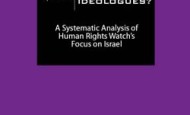Experts or Ideologues? Joe Stork
The references for this article are available here.
Joe Stork – Deputy Director of the Middle East and North Africa Division
Before joining HRW in 1996, Joe Stork was a highly visible pro-Palestinian political activist involved in the Middle East Research and Information Project (MERIP). He was also a co-founder and editor of Middle East Report 17 (Safian 2009). MERIP was centrally involved in activities of the radical Left,18 and its rhetoric reflected Marxist anti-imperialist ideology. MERIP Reports carried laudatory interviews with terrorist leaders and other activists. After the murder of Israeli athletes at the 1972 Munich Olympic Games, a MERIP editorial urged socialists to “comprehend the achievements” of the atrocity. “Munich and similar actions cannot create or substitute for a mass revolutionary movement….But we should comprehend the achievement of the Munich action.” While noting that this did not justify the murders, the editorial declared that this action “has provided an important boost in morale among Palestinians in the camps” (MERIP Report 1972). Similarly, after a Palestinian terror attack on an Israeli school on May 15, 1974, MERIP declared that “all Israeli settlers are potential targets of the Palestinian resistance” (MERIP Report 1974).
Detailed research published by Safian notes Stork’s participation in a conference on “Zionism and Racism” at the University of Baghdad in 1976, under the auspices of Saddam Hussein (Safian 2009). Stork’s presentation is published in the conference volume19 and includes references to the “Zionist colonization of Palestine” (p. 209), the “Zionist settler-colonial enterprise” (p. 214), and the “Zionist theft of the property and productive resources” (p. 218). Referring to the Arab defeat in 1967, Stork declares: “…the single most important cause lay with the failure of the regimes in question to mobilize their societies for the kind of protracted struggle that is critical for the liberation of Palestine” (p. 225).
In his response to criticism that included these quotes, Stork wrote: “Most of them I do not recognize, and they are contrary to the views I have expounded for decades now. For instance, selective excerpts about the Munich massacre come from an unsigned editorial that appeared 37 years ago where at the time I was one of seven volunteers that produced the publication.”20
But this radical post-colonial rhetoric and distortion of events to fit this framework did not end as Stork matured, but continued through the 1980s and 1990s. In the September 1980 edition of MERIP reports (p. 6), he confused cause and effect referring falsely to Jordan’s “Black September attack on the Palestinian resistance in 1970.” In this piece, as Safian notes, Stork also refers disdainfully to the Camp David “Peace” Treaty (p. 9) and attacks Jordan as a “classic mercenary state” (p. 10) for failing to sufficiently support the Palestinian cause. Additional articles such as “Nuclear Shadow over the Middle East” (Stork 1986), and “North Africa Faces the 1990s” (Stork 1990), use similar ideological rhetoric to attack Israel. In 1992, Stork wrote a chapter on “U.S. policy and the Palestine Question” for a book entitled The United States and the Middle East: A search for new perspectives, edited by Hooshang Amirahmadi (Stork 1992). In this piece he continued to use the same kind of radical vocabulary, attacking “Zionist hegemony,” new colonialists, American-Israeli conspiracies, “the elaborate ritual labeled the peace process” and Israel’s democratic values.
In examining Stork’s publications spanning over twenty years, there is no hint of any expertise or interest in international moral or legal norms in general, or human rights, in particular. Instead, the consistent focus is on attacking Zionism, Israel, and American imperialism in the Middle East, while promoting the Palestinian narrative.
Since joining HRW, Stork has continued to promote this ideological agenda, and as of 2004 he was still included in the “MERIP media resource list.” In 2007 MERIP published an article on a panel discussion in which Stork joined the other participants in supporting the Durban-based Boycott, Divestment and Sanctions (BDS) movement against Israel (Horton 2007). In a public letter to President Bush (HRW Letter May 11, 2008), Stork and his co-authors distorted international legal terminology, repeated incomplete or false analyses of international law (including the allegation of “collective punishment”), and minimized or omitted Hamas’ attacks on Israeli border crossings where humanitarian aid is delivered, as well as the diversion of that aid by Hamas. Stork’s responses to substantive criticism consist of ideological allegations and ad hominem attacks.21
In these and many other examples, including a January 2008 statement on Gaza (HRW News Release Jan. 25, 2008), Stork’s work for HRW reflects an absence of credible methodology, and a lack of accurate and properly-sourced legal analyses, while favoring political diatribe, loosely couched in the terminology of international law. Similar properties characterize the August 2009 HRW report accusing Israel of the morally odious crime of killing Palestinian civilians waving white flags, which Stork co-authored (HRW Report Aug. 13, 2009).

